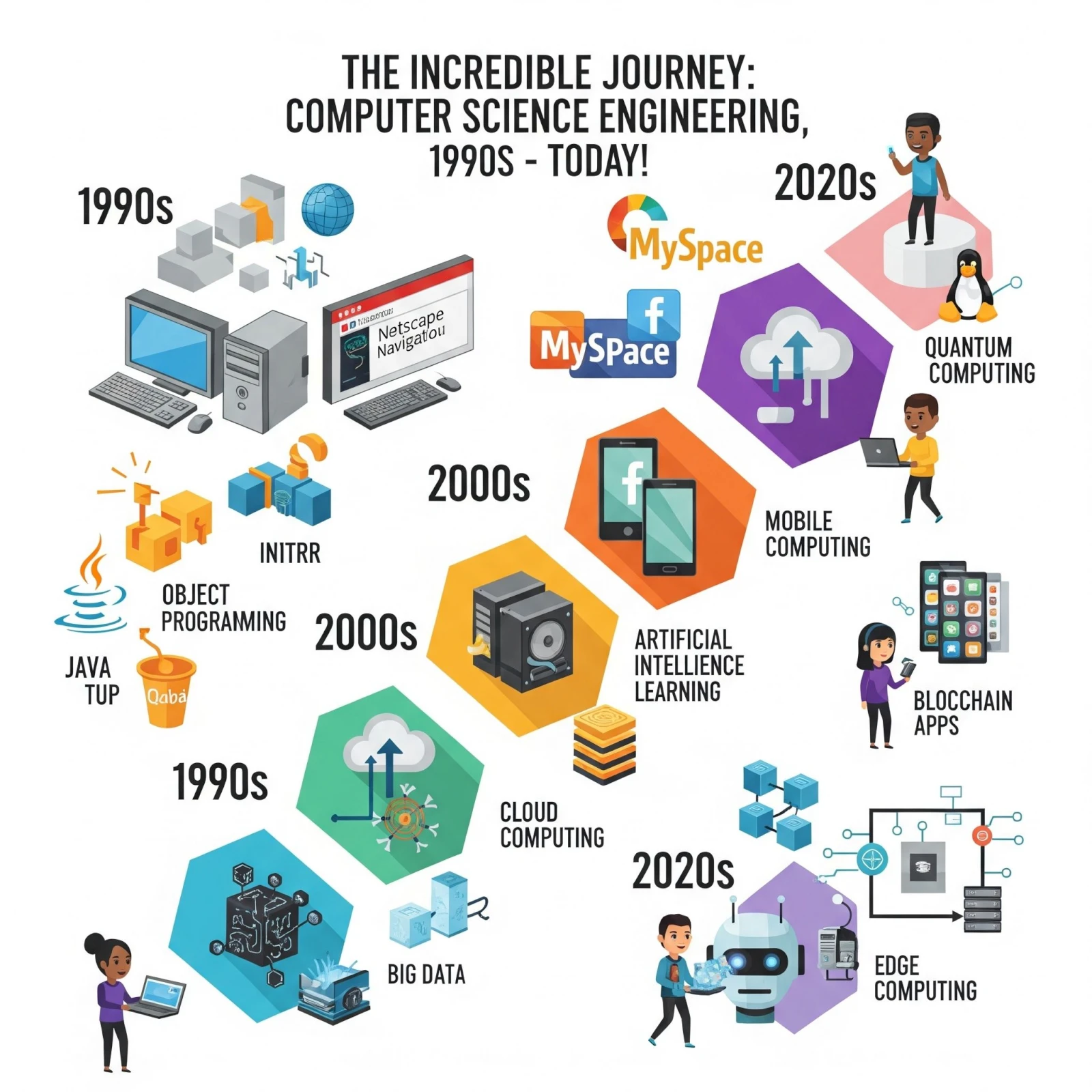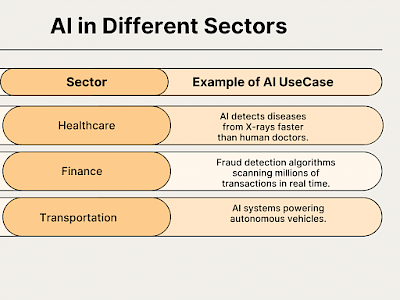Still Think CSE is Just about Coding? Discover How Computer Science Engineering is Evolving in the Era of AI

Blog / August 23, 2025
B.Tech. CSEB.Tech. CSE with AIB.Tech. CSE with AI, ML, NLPThe idea that Computer Science Engineering is just about coding is outdated. In the era of Artificial Intelligence, a Computer Science degree equips learners to do far more than write programs.
While coding is still a very important skill, one cannot ignore the fact that AI can now generate clean code in seconds. Today, the role of a computer science engineer has moved far beyond writing functional code. Now, they are seen as the professionals who can design intelligent, adaptive, and secure systems that hold up under real-world demands.
For B.Tech. Computer Science students, this means learning subjects that merge technology, analytics, and creativity - skills that open doors to industries driving the next wave of global change.
Table of Contents
- The Evolution of Computer Science Engineering
- How the Digital Revolution Has Expanded the Scope of Computer Science
- Artificial Intelligence and Machine Learning as the Core Pillars of Computer Science
- Trending Technologies Shaping the Path of Computer Science Beyond AI
- AI-Driven Applications Across Sectors - Real-World Examples That Define the Future
- Step Into the Next Era of Engineering Excellence: B.Tech. CSE at Shiv Nadar University (Institution of Eminence)
- Conclusion
- FAQs
The Evolution of Computer Science Engineering
Computer Science Engineering started in an era when programs were fed into machines using punch cards. It took days to get results.
Today, AI models have the capacity to process billions of data points in a few seconds. The journey looks like this:
|
Era |
Technology Focus |
Impact |
|
1960s–1970s |
Punch cards, mainframes |
Early automation of tasks |
|
1980s–1990s |
Personal computers, basic networking |
Widespread office and home computing |
|
2000s |
Internet, mobile computing |
Global connectivity |
|
2010s |
Cloud computing, big data |
Large-scale, data-driven systems |
|
2020s–present |
AI, machine learning, quantum tech |
Predictive, adaptive technologies |
For a student, this means the skills required have also evolved. Earlier, one had to focus on syntax and error-free code. Now though, the skill is in knowing what to build, how to integrate AI, and how to make systems ethical and secure.
How the Digital Revolution Has Expanded the Scope of Computer Science
The scope of CSE has grown faster in the past decade than in the previous many decades combined.
Now, it is no longer simply limited to building desktop software or e-commerce apps, as it has expanded into building intelligent systems that can think, learn, and adapt.
Computer Science Engineering is evolving through cross-functional integration, with AI diagnosing diseases, blockchain securing financial transactions, and IoT transforming manufacturing; real-time decision-making, from self-driving cars to instant fraud detection; and cloud-first systems built on global networks for faster, scalable, and more reliable services.
For a student in B.Tech. Computer Science, this means learning subjects that cover far more than programming languages.
Subjects in B.Tech. Computer Science now often include:
- Data Science and Analytics
- Artificial Intelligence & Machine Learning
- Cybersecurity
- Cloud Computing
- Internet of Things and
- Natural Language Processing
The integration of these subjects into B.Tech. CSE syllabus is a true reflection of how this branch of engineering is re-designing itself to cater to the global demand and shift in skill-set required from new-age CSE graduates.
Artificial Intelligence and Machine Learning as the Core Pillars of Computer Science
AI and ML are no longer electives or niche fields; they are central to the B.Tech. Computer Science curriculum.
Machine learning enables systems to learn from their experiences to improve performance. Deep learning correctly utilizes the layered neural networks within machine learning to detect patterns in complex data. Natural Language Processing (NLP) enables systems to extract knowledge and ultimately understand human language and communicate effectively.
Many universities introduce AI as an elective in the 2nd or 3rd year of a B.Tech. Computer Science qualification. Students build AI systems using machine learning and deep learning, and also learn to work with Cloud AWS or Microsoft Azure.
The integration of AI, ML, and others as B.Tech. Computer Science subjects are not just about adding more topics. It is about changing the way future engineers think, from writing fixed instructions to building systems that can learn, adapt, and act on their own.
Trending Technologies Shaping the Path of Computer Science Beyond AI
While AI dominates headlines, it is only part of the change in Computer Science Engineering. The modern curriculum blends AI with other technologies that are growing at the same speed. Some of the key technologies include:
- Quantum Computing
- Edge Computing
- Blockchain and
- Green Computing
An ideal B.Tech. Computer Science program ensures students can link these fields with AI to create efficient, secure, and scalable systems.
AI-Driven Applications Across Sectors - Real-World Examples That Define the Future
Artificial Intelligence is now at the center of many industries. Students studying B.Tech. Computer Science will encounter real-world use cases where AI systems do work that once required entire teams.

Step Into the Next Era of Engineering Excellence: B.Tech. CSE at Shiv Nadar University (Institution of Eminence)
The B.Tech. Computer Science and Engineering program at Shiv Nadar University is designed for students who want to lead technology into its next evolution. At the School of Engineering, students learn core concepts under the direction of world-class faculty and industry practitioners while their imagination expands in well-equipped advanced labs for AI, cybersecurity, and data science.
The curriculum doesn’t just respond to market trends: it creates them. Right from the first semester of the course, students get involved in hands-on projects and get research opportunities along with learning interdisciplinary subjects and applying concepts learned in classrooms into the labs. Our strong partnerships with industry provide students with amazing opportunities for internships, live projects, and recruitment drives with the world’s leading companies.
Graduates of the School of Engineering leave with more than a degree: they have the ideas, skills, and confidence to innovate in a variety of industries.
Conclusion
Over the last decade, Computer Science Engineering has moved far beyond its old reputation as a coding-heavy discipline.
With AI, automation, ML, etc. shaping the path of technical advancements, this shift has not just created new opportunities for a bright career path, but has also modernized the way of working of many traditional job roles. Those who start learning these skills now will lead projects that shape the next decade.
As a B.Tech. Computer Science graduate from Shiv Nadar University, you won't just be the person who knows how to code, you will be in a position to design, build, and manage intelligent systems that will fuel the future.
Apply now and take the first step towards building the career you’ve imagined, and even go beyond.
FAQs
What subjects are taught in a modern B.Tech. Computer Science course?
Modern B.Tech. CSE course includes subjects such as AI, machine learning, cloud computing, IoT, cybersecurity, data science, etc. The electives may cover blockchain, green computing, and quantum computing.
How is AI changing the career scope of CSE graduates?
AI has added roles in robotics, data analytics, natural language processing, etc, while upgrading traditional roles with smarter tools.
Is coding still important in an AI-driven CSE career?
Yes, but coding is now one part of a broader skill set that includes system design, integration, and AI model training.